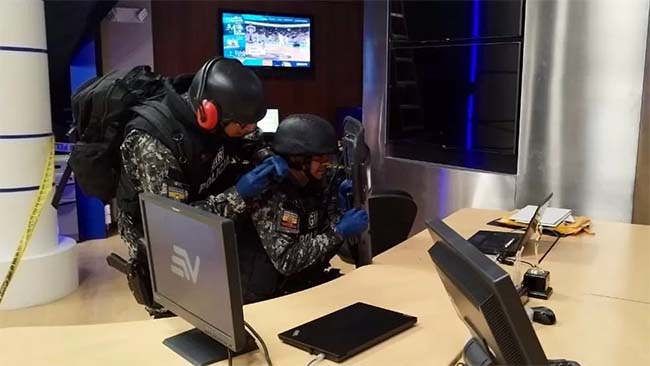Journalists across Ecuador have been targeted by explosive devices sent through the post
Shared from/by Antoinette Radford
BBC News
One presenter, Lenin Artieda, was injured when he opened the envelope in the middle of the newsroom.
He said the explosive device looked like a USB drive. He plugged it into his computer and it detonated.
The Ecuadorean attorney-general’s department confirmed it had opened a terrorism investigation into the letters on Monday.
It did not name the specific news outlets targeted. However, at least five different organizations across Ecuador were sent the letters.
The government has condemned the attacks, describing freedom of expression as “a right that must be respected”.
“Any attempt to intimidate journalism and freedom of expression is a loathsome action that should be punished with all the rigour of justice,” it said in a statement.
The interior minister, Juan Zapata, said the devices were all sent from the same town. Three were sent to media outlets in Guayaquil and two to the capital, Quito.
While Artieda was injured by the device, others sent through the post failed to explode or were never opened.
Police carried out a controlled detonation of one of the devices sent to TC Television, prosecutors confirmed.
Ecuador’s head of forensic science said they contained “military-type” explosives.
Ecuador has experienced an increase in violence, which its President, Guillermo Lasso, said is a result of competition between drug trafficking gangs for territory and control.
The Andean country, which is used as a cocaine-smuggling route from neighboring Peru and Colombia, has seen a sharp rise in murders and gang-related crime in recent months.
Guayaquil, Ecuador’s second-largest city, where three of the explosives were sent, has experienced dramatic levels of violence including decapitated bodies hanging from pedestrian bridges and deadly prison riots between rival gangs.
Gulf Clan: Colombia suspends ceasefire with drug cartel
Colombian President Gustavo Petro has suspended a ceasefire with the country’s main drug trafficking cartel, the Gulf Clan
by Vanessa Buschschlüter
BBC News
He accused it of “sowing anxiety and terror” and ordered the security forces to reactivate their military operations against the criminal gang.
The ceasefire had been agreed in December as part of the president’s plan for “total peace” in Colombia.
Its suspension is a major blow to Mr Petro’s attempt to end armed conflict.
His policy is radically different from that from his predecessor in office, Iván Duque, who tried to secure peace by stepping up military operations against Colombia’s illegal armed groups.
Mr Petro is instead trying to negotiate an end of hostilities with dozens of criminal organisations.
On 31 December 2022, the government had announced that it had reached a bilateral ceasefire with the Gulf Clan as well as rebels of the National Liberation Army (ELN) and dissidents from the Revolutionary Armed Forces of Colombia (Farc) among others.
But this past week, President Petro has accused the Gulf Clan of breaking the ceasefire, blaming it for an attack on an aqueduct and saying it had incited protests from informal gold miners.
In a tweet, he also accused Gulf Clan members of shooting at police officers.
“From this moment, there is no ceasefire with the Gulf Clan. The security forces need to act immediately against the structures of this mafia organisation,” he wrote.
The head of Colombia’s police force, Henry Sanabria, said that more officers would be mobilised and sent to the areas where the Gulf Clan is most active.
The cartel has a presence in many of Colombia’s provinces and has established international connections with other criminal organisations, with whom it collaborates to smuggle drugs from Colombia to the US and as far away as Russia.
It is also engaged in people-smuggling and illegal goldmining.
The capture of its leader, Dairo Antonio Úsuga, also known as Otoniel, in 2021 weakened the structure of Gulf Clan, but cells of the group of have continued to operate.
President Petro has said that there is “obviously no possibility of negotiation” while the Gulf Clan continues to engage in illegal activities and attacks.



